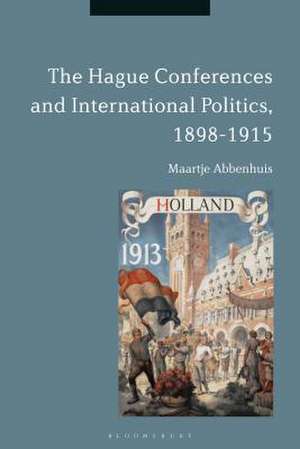The Hague Conferences and International Politics, 1898-1915
Autor Maartje Abbenhuisen Limba Engleză Hardback – 17 oct 2018
| Toate formatele și edițiile | Preț | Express |
|---|---|---|
| Paperback (1) | 226.14 lei 6-8 săpt. | |
| Bloomsbury Publishing – 29 apr 2020 | 226.14 lei 6-8 săpt. | |
| Hardback (1) | 710.44 lei 6-8 săpt. | |
| Bloomsbury Publishing – 17 oct 2018 | 710.44 lei 6-8 săpt. |
Preț: 710.44 lei
Preț vechi: 1025.25 lei
-31% Nou
Puncte Express: 1066
Preț estimativ în valută:
135.96€ • 140.26$ • 115.07£
135.96€ • 140.26$ • 115.07£
Carte tipărită la comandă
Livrare economică 05-19 martie
Preluare comenzi: 021 569.72.76
Specificații
ISBN-13: 9781350061347
ISBN-10: 1350061344
Pagini: 304
Ilustrații: 25 bw illus
Dimensiuni: 156 x 234 x 20 mm
Greutate: 0.25 kg
Editura: Bloomsbury Publishing
Colecția Bloomsbury Academic
Locul publicării:London, United Kingdom
ISBN-10: 1350061344
Pagini: 304
Ilustrații: 25 bw illus
Dimensiuni: 156 x 234 x 20 mm
Greutate: 0.25 kg
Editura: Bloomsbury Publishing
Colecția Bloomsbury Academic
Locul publicării:London, United Kingdom
Caracteristici
Revises the historiography of the Hague conferences and highlights the significance of public diplomacy in international relations of the time
Notă biografică
Maartje Abbenhuis is Associate Professor in Modern European History at the University of Auckland, New Zealand. She has published widely on the history of neutrality and internationalism, including The Art of Staying Neutral: The Netherlands in the First World War (2006) and An Age of Neutrals: Great Power Politics 1815-1914 (2014).
Cuprins
List of Illustrations List of Abbreviations AcknowledgementsIntroduction: For The Peace of the WorldChapter 1: How The Nineteenth Century Shaped the Hague Conferences Chapter 2: The Tsar, The Rescript and The World Chapter 3: A Coram Publies: Planning the First Hague Conference, 1899 Chapter 4: It Is Not Enough! The First Hague Conference, 1899 Chapter 5: Civilization at War, 1899 - 1906 Chapter 6: A Holy Duty: Activists for The Hague Chapter 7: When the World Showed Up. The Second Hague Conference, 1907 Chapter 8: City of Peace: The Hague, 1907-1915 NotesBibliography Index
Recenzii
But how does one take measure of anything as sweeping and opaque as global public opinion from over a century ago? Abbenhuis has a modern response: digital newspaper databases .. Abbenhuis's ambitious book demonstrates the merits of this methodology.
Important for historians of international politics ... [and] also highly relevant for historians of international law ... Historians of the Low Countries, finally, will find in the book a fascinating account.
A valuable contribution to debates about internationalism and the role of 'public opinion' in the conduct of diplomacy in the early twentieth century. Written in an engaging and accessible style, it will benefit students and established scholars alike.
This book rethinks the place of the Hague conferences in modern international history. The public enthusiasm for peace endowed the work of the conferences with meaning and power, with crucial political implications throughout an often violent twentieth century. In a work, leavened with wit and personality, Abbenhuis shows how the conferences brought about real political change.
Here is a compelling account of the forging of the framework of today's global laws of war and peace. Abbenhuis writes transnational history with a light touch and a shrewd eye for a moment when the Hague became what it is today -- a synonym for the search for peace and justice. Essential reading for students of twentieth-century history.
In this definitive and comprehensive study of The Hague Conferences of 1899 and 1907 and their legacies, Abbenhuis situates their accomplishments and limitations in the global "landscape of voices" that influenced them. Peace advocates, countless newspapers and books, politicians, women's organizations, and intellectuals helped normalize a discourse of "peace through law" that has had a lasting effect on the development of international law and the regulation of state-sponsored conflict around the world.
A stimulating, informative and well-written book.
[An] engrossing volume ... All historians of international politics will benefit from [Abbenhuis'] work.
Important for historians of international politics ... [and] also highly relevant for historians of international law ... Historians of the Low Countries, finally, will find in the book a fascinating account.
A valuable contribution to debates about internationalism and the role of 'public opinion' in the conduct of diplomacy in the early twentieth century. Written in an engaging and accessible style, it will benefit students and established scholars alike.
This book rethinks the place of the Hague conferences in modern international history. The public enthusiasm for peace endowed the work of the conferences with meaning and power, with crucial political implications throughout an often violent twentieth century. In a work, leavened with wit and personality, Abbenhuis shows how the conferences brought about real political change.
Here is a compelling account of the forging of the framework of today's global laws of war and peace. Abbenhuis writes transnational history with a light touch and a shrewd eye for a moment when the Hague became what it is today -- a synonym for the search for peace and justice. Essential reading for students of twentieth-century history.
In this definitive and comprehensive study of The Hague Conferences of 1899 and 1907 and their legacies, Abbenhuis situates their accomplishments and limitations in the global "landscape of voices" that influenced them. Peace advocates, countless newspapers and books, politicians, women's organizations, and intellectuals helped normalize a discourse of "peace through law" that has had a lasting effect on the development of international law and the regulation of state-sponsored conflict around the world.
A stimulating, informative and well-written book.
[An] engrossing volume ... All historians of international politics will benefit from [Abbenhuis'] work.
